Let’s be real – puppy biting is one of the absolute worst parts of having a puppy.
Those teeth may be small, but they can do some serious damage! All the nipping and biting at your skin and clothing can leave you at your wit’s end.
The good news is that puppy biting is usually a phase, and in the meantime, there are some ways you can minimize the biting and help your little lad play nice.
We’ll fill you in on everything you need to know below!
Key Takeaways: My Puppy Is Attacking Me!
- Biting is a common part of normal puppy play behavior. And while it can certainly be annoying (not to mention painful!), it usually subsides with time and is no cause for concern.
- In very rare cases, puppy biting can be indicative of an aggression problem. In such cases, you’ll usually see other troubling signs, such as stiff body language or a constant “edginess.”
- Normal play biting is pretty easy to address. You’ll want to start by ensuring all of your pup’s needs are being met, but you can also do things like offering her a chew toy when she gets mouthy.
Is My Puppy Aggressive or Just Playful?

Nipping and biting are usually completely normal puppy behaviors. While it might be painful and frustrating, mouthiness does not necessarily mean your puppy is aggressive.
However, even though it is very rare, it is possible for a young puppy to be aggressive. So how can you know if your pup’s biting is typical, playful behavior or if it’s aggression? Let’s break down normal puppy mouthiness versus true aggression.
Normal Puppy Biting
All puppies engage in bitey behavior, but the frequency and intensity can vary from puppy to puppy.

Some puppies get bitey under certain circumstances, such as during rough play or when they’re hungry.
For others, biting is seemingly their full-time job. It’s also normal for the amount of biting to fluctuate day to day, as your puppy develops.
Likewise, the intensity of the biting can also range from gentle nips to hard bites that break skin.
Yep, even painful bites that draw blood or leave a bruise are likely normal. We’re not saying you should just sit there and be your pup’s chew toy (we’ll get into ways to deal with this in a bit), but typical puppy biting can be quite intense.
It’s also normal for puppies to bite clothing and hair. She might even latch onto your sock or pant leg with a strong grip. My whippet puppy thought it was great fun to grab onto my sweatpants and dangle. (This was not my personal definition of fun.)
Vocalization can also accompany normal puppy mouthiness. Your pup might bark or playfully growl as she bites you. Depending on the reason for your puppy’s biting (which we will explain next), this vocalization can seem like a lot but still doesn’t cross over into the realm of aggressive behavior.
Finally, breed can also influence how bitey your pupperino is. For example, Belgian Malinois are often bred specifically for protection work, in which biting and holding are desirable. A Malinois puppy will likely be a very mouthy canine, compared to a Havanese puppy, who’s primarily bred for companionship.
Most people concerned by their puppy’s biting have a completely normal pooch on their hands. They may just be unaware of how intense typical puppy nipping can be and need help teaching their pup to play nice.
But it’s still normal puppy behavior.
Aggressive Puppy Biting

Truly aggressive puppies are very rare, but they do exist. Let’s look at some ways to distinguish an aggressive puppy from a typical bitey puppy.
- Aggressive signals accompany the biting. As we’ve established, puppy biting in itself is not aggression. But if the biting comes with lunging, baring teeth, or snarling, then it may be aggressive behavior.
- The puppy’s face and body are stiff. Puppies, like adult dogs, will have a “hardness” to their face and body while snapping or biting aggressively. Puppies who are biting playfully will be looser and “softer,” meaning they don’t look as tense or stiff (even if the bite itself is painful).
- There is an “edginess” to the puppy. This one is a bit vague, but aggressive puppies have an “edge” or “sharpness” that typical puppies just don’t exhibit. These pups can seem unpredictable and even scary.
While this article focuses on puppies who bite their owners, it’s also possible for puppies to display true aggression toward other dogs or pets. They might go after another puppy or dog with the intent of causing harm.
Some puppies seem to be “wired” wrong from a very young age. Their behavior is “off.”
Why Do Puppies Bite, Anyway?
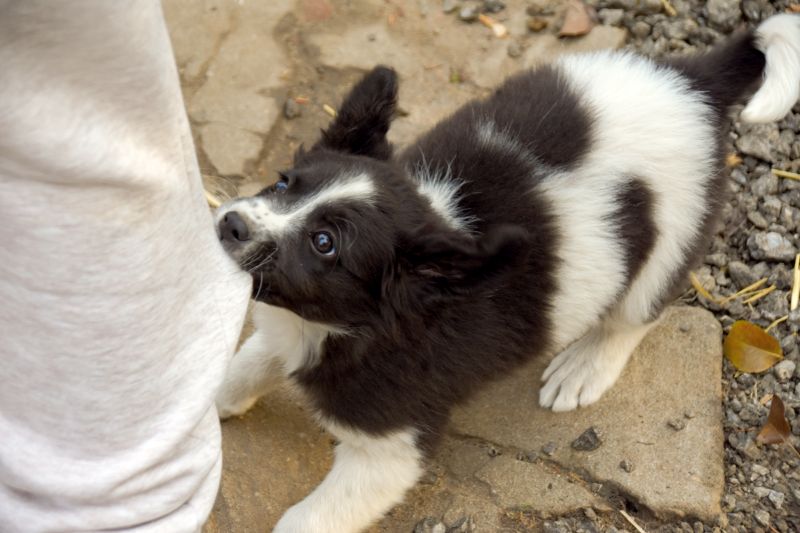
Before we discuss how to stop your puppy from attacking you, it’s important to understand why she’s biting in the first place. This will help you better prevent and manage it. While this is not an exhaustive list, here are the most common reasons why puppies bite.
Playful Interaction
If you’ve ever seen a litter of puppies playing, you’ll observe lots of nips and bites. It’s just how puppies play. When your pup comes home, she no longer has siblings to chomp on, so you’re the next best thing from her perspective.
Through play biting, puppies can learn bite inhibition, which is the ability to limit the pressure of a bite so that it’s not as painful or damaging. If a puppy bites a sibling too hard during play, the sibling will likely yelp and stop the game. This teaches pups to soften their mouths while playing.
It’s very common for puppies to become bitey when you’re trying to play together.
Your pooch may even have her teeth on a toy, and then redirect her chompers onto your skin or clothes. And if you’re playing without a toy involved, she’ll likely go for a body part.
Your puppy doesn’t have hands or speak your language, so she will use her mouth to interact with you. You may find that your puppy nips you even when you’re not playing. This can be her way of trying to engage you in some fun.
Unmet Needs
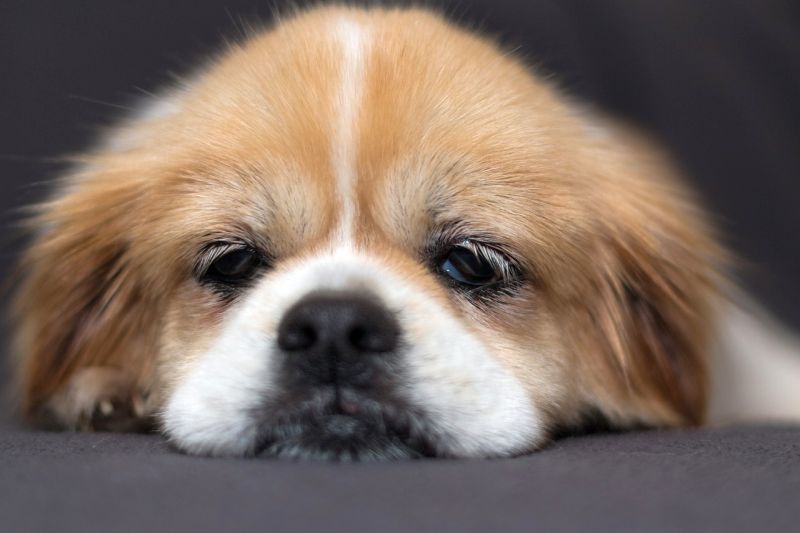
Another common reason puppies bite is because they are trying to communicate an unmet need.
Perhaps she needs to go potty, and in an attempt to tell you that, she starts nipping at your feet. Maybe she’s extra hungry because she’s going through a growth spurt, and those “hangry” feelings manifest as hard bites. Or she hasn’t had enough attention or exercise to feel content, so her energy is coming out through her teeth.
Your puppy can’t ask politely for the things she needs, and sometimes it can be a bit like solving a mystery to figure out what she’s communicating through her behavior. Keep in mind that sometimes biting is your pup’s way of trying to get her needs met.
Frustration
Biting can also occur when a puppy feels frustrated.
Think of toddlers who become frustrated when they try to do something by themselves but can’t, such as putting on a shirt.
As their frustration builds, they may yell, hit, or roll around on the ground crying.
Like toddlers, puppies aren’t the best at regulating their feelings and might bite out of frustration. Some pups have especially low frustration tolerance and quickly resort to biting.
Here are some examples of situations that may cause frustration biting for a puppy:
- A toy or treat is being held out of the puppy’s reach, perhaps in a teasing way. She can’t access the thing she wants, so she chomps the person’s arm.
- The puppy is being held by her owner, but she would like to be put down. She squirms and whines, but her human holds tight. As her frustration grows, she bites.
- On a walk, the puppy sees another dog she wants to play with. Her owner keeps the leash tight to prevent an interaction as the dog passes by, which frustrates the puppy. She bites at the leash and then jumps up on her human, nipping at whatever bit of clothing she can snatch.
Overstimulation

Just like human children (or even adults), puppies can become overstimulated, which may trigger biting. This isn’t aggressive biting, but it can be intense, obnoxious, or painful.
Here are some common scenarios that can overstimulate a puppy:
- Playtime that is too much. If your play is too rough or goes on for too long, she might turn into a Tasmanian devil.
- Walks that are too long. I’ve had so many owners tell me that their pup goes crazy after ten or fifteen minutes of a walk, biting at their shoes, or launching through the air grabbing at whatever body part she can snatch. The walk is simply too long for her growing puppy brain.
- Exciting situations. Contexts that create a lot of excited feelings can push your puppy over the edge into an overstimulated state. Perhaps your puppy was wrestling with dog friends for a half hour, and now she can’t stop biting at you. Or kids were running around your house, and now she’s a mouthy maniac.
Tiredness
Puppies that are overly tired and in need of a nap often become super bitey. Perhaps your pooch has been awake for a long time and is now becoming overstimulated. Or she just doesn’t have the mental energy to regulate herself anymore.
It’s easy to mistake an overtired puppy for an energetic puppy, but more playtime or exercise will only make the biting worse in the case of an exhausted pooch.
A good nap will “reset” her to more normal levels of mouthiness.
Teething

Around 3 or 4 months of age, puppies start losing their sharp baby teeth as their adult teeth grow in. It’s very common to see an increase in mouthing during this stage, as biting can help relieve irritated gums. Teething can also make puppies feel irritable, and biting can help relieve some of that frustration.
For most puppies, all adult teeth come in by around 6 months, so it’s a short, but sometimes very bitey, time.
Resource Guarding
This is a category of aggressive behavior that may include biting.
Resource guarding is when a dog uses aggression, such as growling, snapping, or biting, to protect something they find valuable. This could be a food bowl, bully stick, toy, piece of trash, or anything else a puppy wants to keep you from taking away.
Mild resource guarding is not uncommon in young puppies. A puppy may freeze or growl if someone approaches while she’s working on a bone, or if they try to take it away. She may also pick the bone up and move further away to work on it if you approach her or reach toward it.
While these forms of resource guarding are mild, they should still be addressed with training, ideally with help from a professional. Without early intervention, the problem can become worse. And with the wrong approach, the puppy’s behavior can become downright dangerous.
A puppy who snaps, lunges, bares teeth, or bites in an attempt to resource guard is showing more extreme aggression.
Fear and Stress
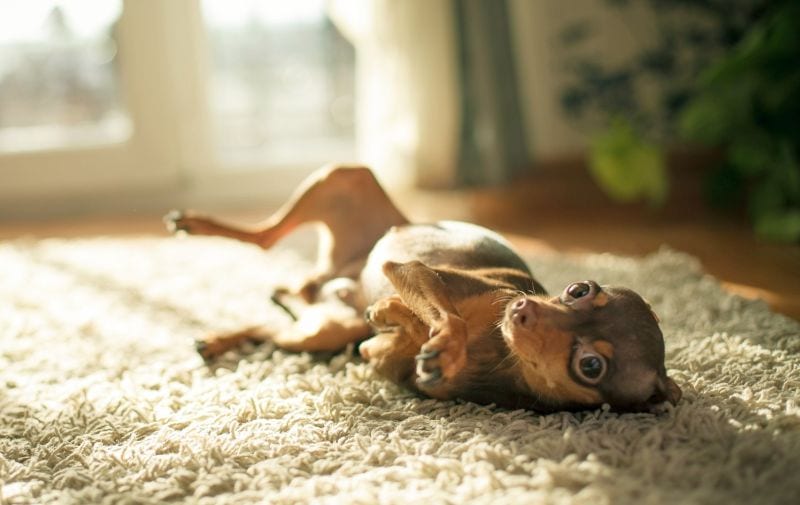
It’s normal for puppies to experience some fear or stress. Ideally, pups can recover quickly from their initial reaction or hesitation and go on their merry way.
However, it’s not normal for puppies to show aggressive behavior, such as growling, snapping, or biting, out of fear or stress. One of my clients has a puppy who tried to bite the vet at his first appointment at 10 weeks old.
This isn’t typical and indicates a need for professional assistance from a behaviorist.
Aggression that comes from fear or stress is often directed at strangers, other dogs, or objects. However, it is possible for a scared or stressed puppy to bite her human too.
Self Defense
Some puppies start out on the spectrum of normal canine behavior. But through life experiences, they learn that it’s necessary to use their teeth to defend themselves.
Treating a puppy in ways that don’t respect her boundaries and feelings can result in a bite. Here are a couple of examples:
- A puppy parent responds to a puppy’s normal nipping by pinning her to the ground or holding their mouth closed, based on some (bad) internet advice. This is scary, stressful, and even painful to the puppy. In an attempt to defend herself from this treatment, she bites aggressively when her owner reaches toward her.
- The puppy runs away when her human tries to pick her up, but the human chases her down and scoops her up anyway. She finds this kind of manhandling very unpleasant. Over time, the pup begins to snap at and bite her owner when approached or picked up.
As we mentioned earlier, some puppies are seemingly “wired wrong” from birth and display true aggression. However, a normal puppy can start biting because of her human’s behavior.
How Do I Stop My Puppy from Attacking Me?
Since most puppy biting falls into the normal category, let’s look at practical ways you can stop her from going full piranha.
It’s unrealistic to expect your puppy to never put her teeth on you, however, it’s possible to minimize the frequency and intensity of her biting.
It’s important to have strategies to manage puppy biting, even if it’s normal. While most puppies will grow out of this around 6 months or so, it’s still painful and obnoxious in the meantime. Additionally, if left unchecked, some pups won’t learn how to use their mouths politely, even as they mature.
Rather than being a puppy punching bag, or crossing your fingers and hoping she’ll grow out of it, utilize these four strategies to curb the biting.
1. Ensure your puppy’s needs are met.
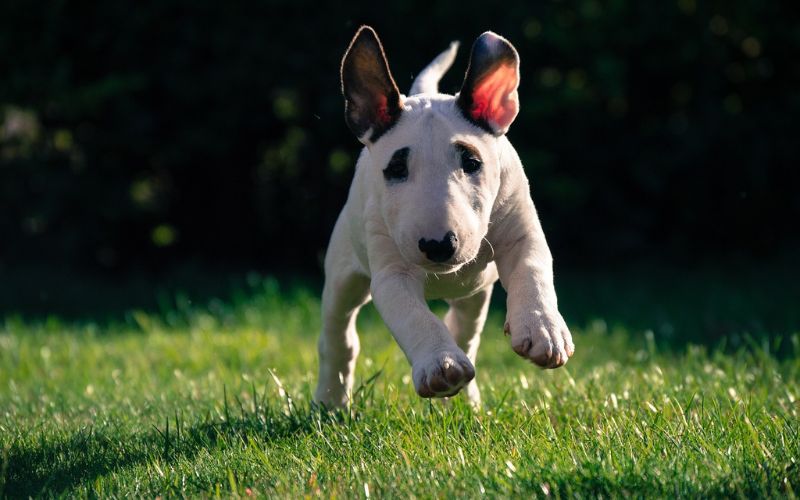
While this may not seem like a direct solution to stopping your puppy’s biting, it’s absolutely critical. It’s very hard to decrease mouthiness if your pup has unmet needs. Here are the key needs to assess:
- Sleep: Overly tired puppies can turn into toothy terrors. Most puppies need 16 to 18 hours of rest per day. So many of my clients have drastically reduced their puppies’ biting by providing nap times throughout the day. If you’re having trouble getting your puppy down for a nap, make sure to check out our tips on getting your dog to sleep.
- Nutrition: If you’re not sure if your pup is getting her caloric or nutritional needs met, talk with your vet. A hangry puppy is likely to nip.
- Exercise: A puppy with pent-up energy may resort to biting as a way to burn it off. Provide your pup with appropriate outlets to move her body and play.
- Potty breaks: Some pups will simply squat and go, but others can become agitated and bitey if they want to go outside. Keeping your puppy on a potty schedule can help prevent this type of biting.
If your puppy is being a bitey terror, always run through this list of needs first. Often, simply checking that box for your pup is all it takes to get her playing nice again.
2. Provide options for your puppy to bite and chew.

Puppies have to use their teeth. It’s a biological and developmental need. If they don’t have plenty of appropriate items to sink their teeth into, they’re more likely to bite you.
Keep toys and chews easily accessible in every room or space your puppy spends time in. This way you always have something she can chomp. If she starts getting nippy, grab a toy or chew and redirect her mouth onto that item.
Give your pup a variety of textures, shapes, and flavors, so she doesn’t become bored and resort to biting your skin or clothing.
Here are some ideas to get you thinking creatively:
- Soft plush toys
- Rope toys
- Frozen toys
- Crunchy water bottle toys
- Chew toys (for puppies specifically)
- Cardboard (boxes, toilet paper rolls, etc.)
- Bully sticks
- Beef tendons
Long toys or toys on a rope, can help keep puppy teeth away from your skin while you play. It’s common for puppies to go from biting a toy to biting your hand when playing. By adding more distance between you and your pup (with either a long toy or a rope), she is much less likely to go after you. You can also consider a flirt pole, or tie string to some toys you already have.
3. Become inaccessible.

One of the best ways to teach your puppy how to use her mouth nicely is to remove yourself from the situation. When your pup starts to nip, and redirecting her to a toy or chew isn’t working, get up and walk away.
If your puppy is likely to follow you and keep biting, you can go on the other side of a baby gate or door. After 20 or 30 seconds, you can try playing again. Grab a toy or chew that will be more enticing before you restart playtime.
As we explained earlier, puppies often bite because as a way of playing and interacting. By removing your puppy’s access to you when she chomps, you show her that biting actually ends the fun. Be consistent with this strategy, as learning takes repetition.
You can also utilize this technique for times your puppy wants to bite you even when you’re not playing with her. If you need to sit at your laptop and do emails, and your pup keeps nipping at your feet, become inaccessible by putting her in an X pen, crate, behind a gate, or on a tether.
4. Modify the ways you interact with your puppy.
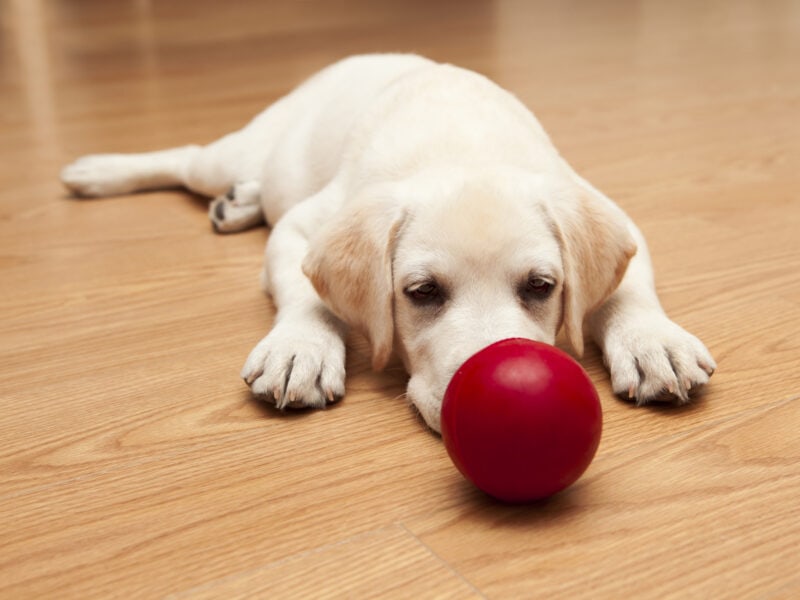
It’s often easier to change our own behavior as owners than to try to train a behavior out of a puppy, especially a hardwired one like nipping. Evaluate how your behavior may encourage rowdy biting, so you can find alternatives that aren’t as triggering.
Here are some examples:
- Arm yourself with a toy when playing with your puppy. This way, she has something appropriate to grab instead of your hands.
- Play in ways that promote calm puppy behavior. High-pitched or loud sounds, rolling on the ground, and a rough style of play will almost always trigger biting. Use a tone of voice and movements that won’t push your puppy into a biting frenzy.
- End playtime before your puppy becomes overstimulated. You can also switch between high-energy play and a calm activity, such as a snuffle mat, which will help her stay regulated.
- Avoid situations that will trigger your pup to bite out of frustration or self-defense. Rather than chasing and cornering your puppy so you can pick her up to take her out for a potty break, let her drag around a lightweight leash (while you can supervise her – you don’t want the leash to get caught on something when you’re not around) so you have a less invasive way to guide her outside.
Shifting your behavior can really make a difference in your puppy’s mouthiness. By shaping more positive (and less bitey) interactions, you can teach her how to engage with you in ways that don’t involve chomping your flesh or clothing.
When Do You Need a Trainer or Behaviorist?

Puppy biting can be stressful. Seeking help from a professional who can assess your situation and give you personalized advice can have a positive effect on your mental health and your relationship with your puppy.
If you see yourself in any of these categories, contact a certified dog behavior consultant who can help you with your puppy’s biting:
- You’re still unsure if your puppy’s biting is normal or aggressive.
- Your puppy’s biting is normal, but it’s a lot and you need help managing it.
- You suspect your puppy is truly aggressive.
- Your puppy has displayed truly aggressive behavior toward you, or any other person or animal.
- You’re feeling overwhelmed or even scared of your puppy’s biting.
Most puppy biting is completely normal, though it can be intense and frustrating. Keeping these tips in mind will help you survive this stage mostly unscathed.
Puppies who bite aggressively are very rare, though some owners mistakenly believe their typical bitey pup is displaying aggression. It’s never a bad idea to consult a behaviorist in situations where you can’t quite tell if your pup’s behavior is normal or not.
Are you struggling with a bitey puppy? Tell us all about her in the comments below!


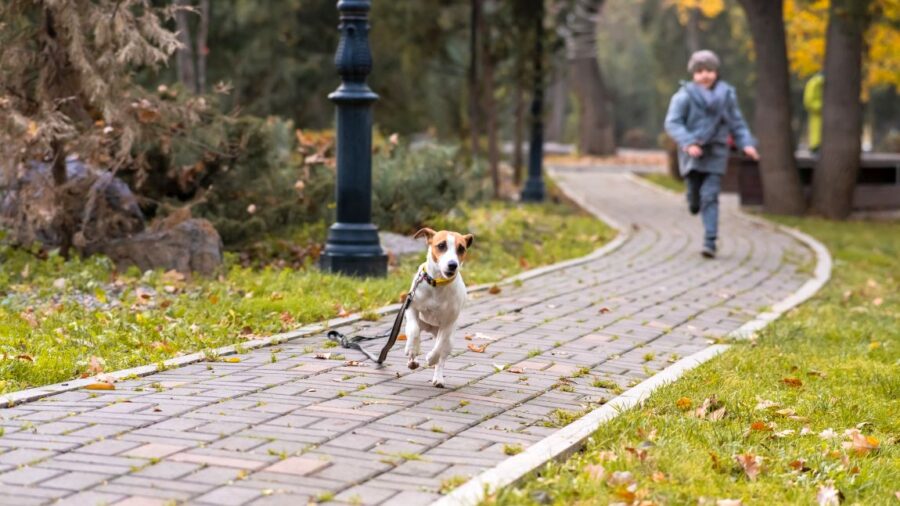


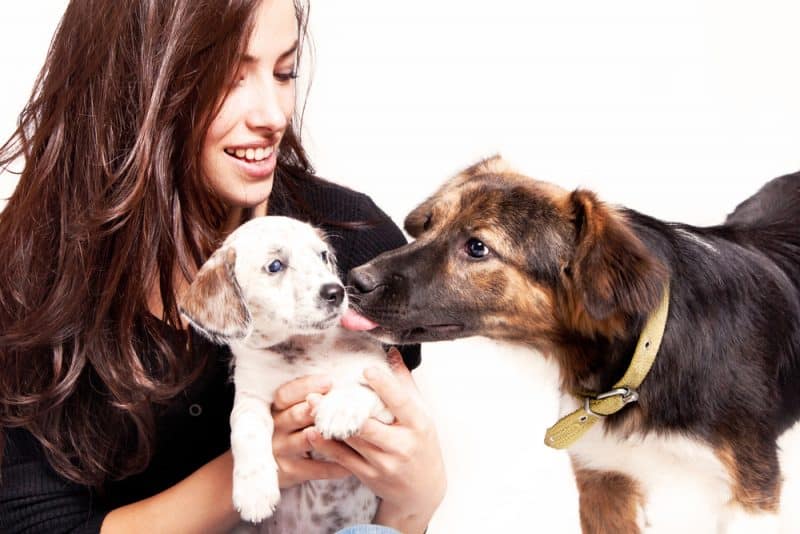
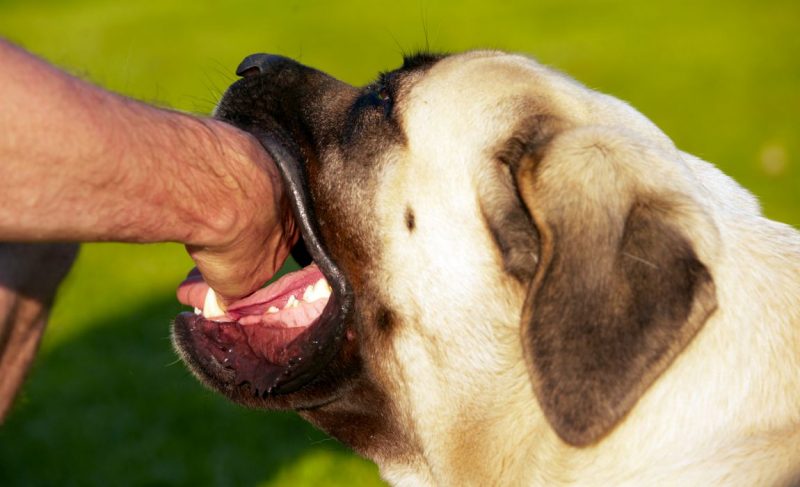
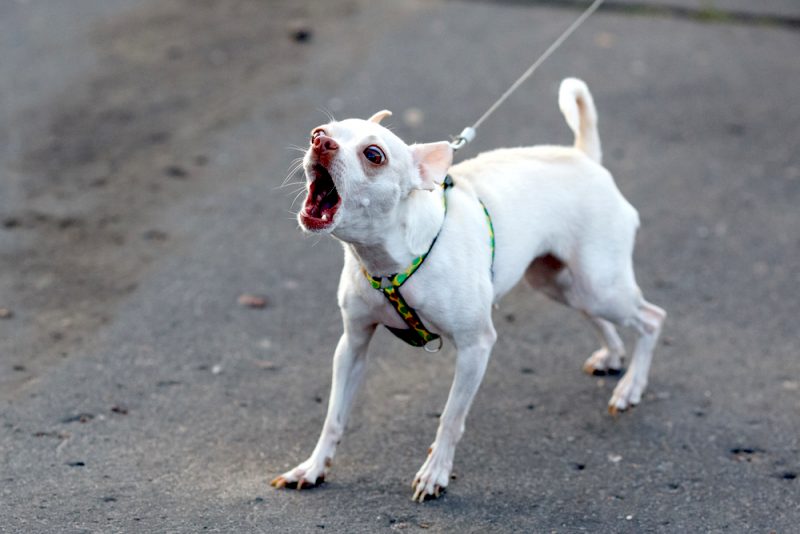
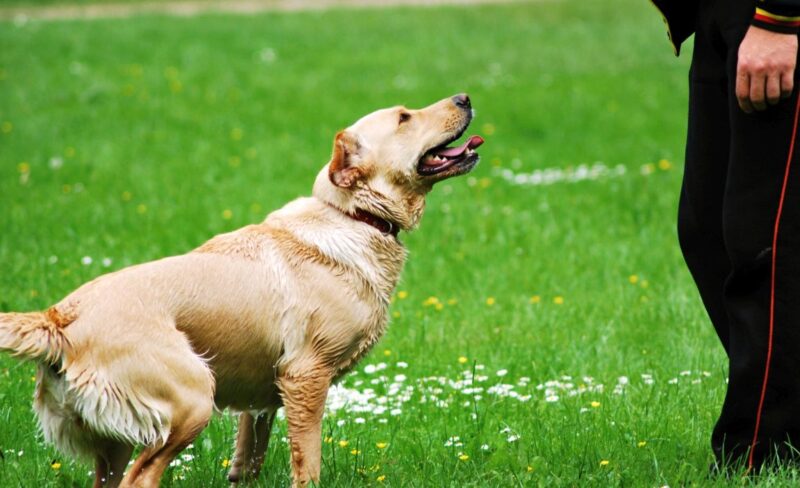
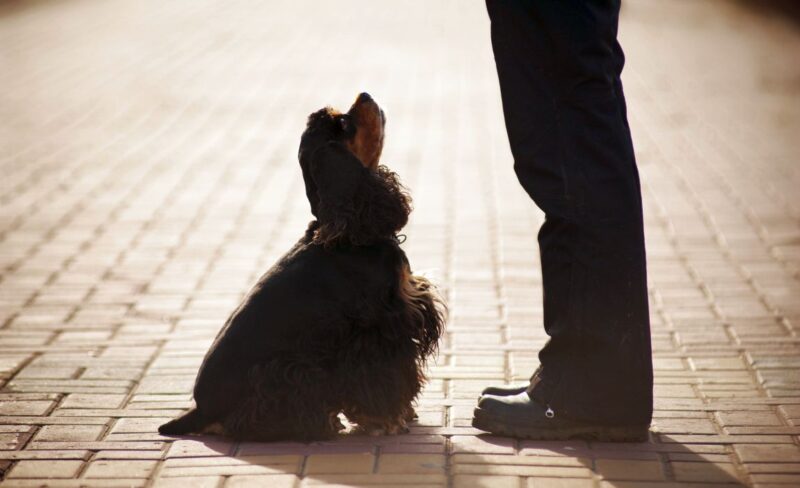
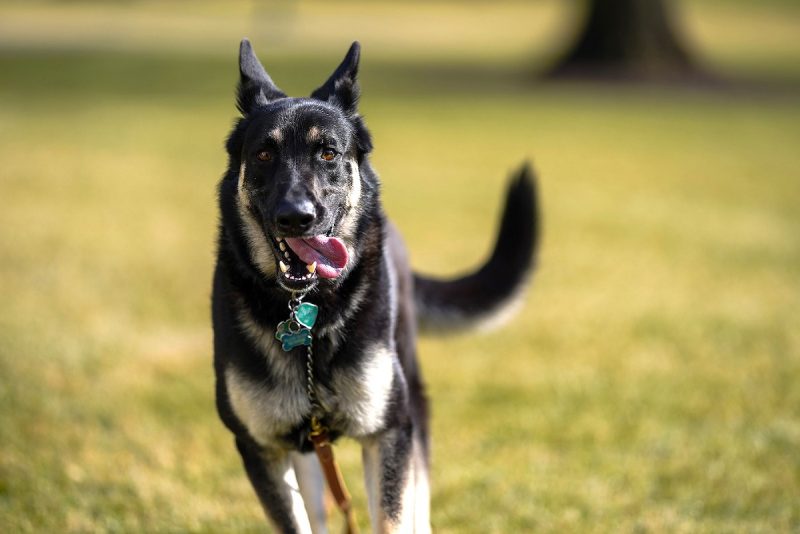

Leave a Comment